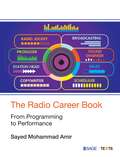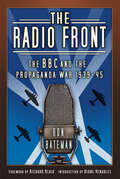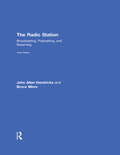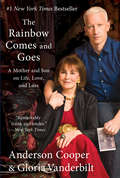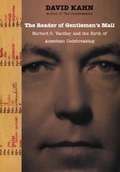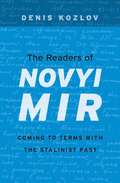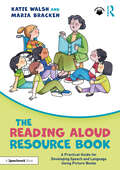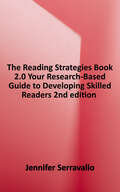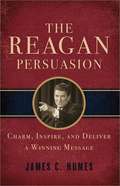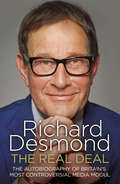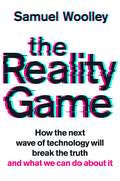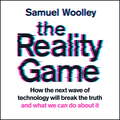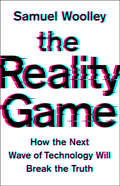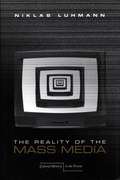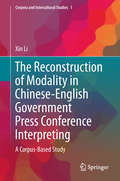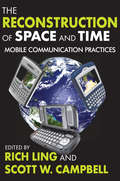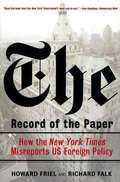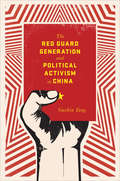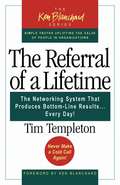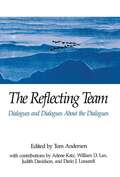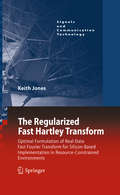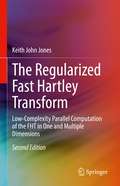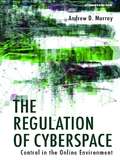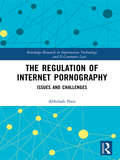- Table View
- List View
The Radio Career Book: From Programming to Performance
by Sayed Mohammad AmirConversational, entertaining and informative, this book is a must-have for anyone aspiring to carve a successful career in radio broadcasting. An outcome of the author's vast experience of working as a radio jockey and programme manager for over 17 years, this book provides a thorough understanding of the various wings and functionaries of the radio industry. From the basics of understanding the pulse of radio listeners, formatting radio programming, making an effective sales pitch and producing great commercials to exhaustive advice on presenting a show, appearing for interviews and improving public speaking, the book will help in developing the right skill set for readers looking for a head start in the radio industry. Key Features: •Provides detailed job descriptions and skill sets required in the radio industry •Focuses on the intricacies of producing a radio show - from creating content to building relationships with the listener •Includes dedicated chapters on radio sales and audience research for better understanding of the commercial aspect of radio •Includes extensive discussion on the history of radio broadcasting, community radio and the FM revolution in India
The Radio Front: The BBC and the Propaganda War 1939-45
by Ron BatemanWithin seventeen years of the first public broadcast in Britain, the nation again found itself at war. As the Second World War progressed, the BBC eventually realised the potential benefits of public radio and the service became vital in keeping an anxious public informed, upbeat and entertained behind the curtains of millions of blacked-out homes. The Radio Front examines just how the BBC reinvented itself and delivered its carefully controlled propaganda to listeners in the UK and throughout Nazi-occupied Europe. It also reveals the BBC’s often-strained relationships with the government, military and public as the organisation sought to influence opinion and safeguard public morale without damaging its growing reputation for objectivity and veracity.Using original source material, historian and author Ron Bateman tracks the BBC’s growth during the Second World War from its unorganised and humble beginnings to the development of a huge overseas and European operation, and also evaluates the importance of iconic broadcasts from the likes of J.B. Priestley, Vera Lynn and Tommy Handley.
The Radio Station: Broadcasting, Podcasting, and Streaming
by Bruce Mims John Allen HendricksThe Radio Station offers a concise and insightful guide to all aspects of radio broadcasting, streaming, and podcasting. This book’s tenth edition continues its long tradition of guiding readers to a solid understanding of who does what, when, and why in a professionally managed station. This new edition explains what "radio" in America has been, where it is today, and where it is going, covering the basics of how programming is produced, financed, delivered and promoted via terrestrial and satellite broadcasting, streaming and podcasting, John Allen Hendricks and Bruce Mims examine radio and its future within a framework of existing and emerging technologies. The companion website is new revised with content for instructors, including an instructors’ manual and test questions. Students will discover an expanded library of audio interviews with leading industry professionals in addition to practice quizzes and links to additional resources.
The Rainbow Comes and Goes: A Mother and Son On Life, Love, and Loss
by Anderson Cooper Gloria Vanderbilt<P>A touching and intimate correspondence between Anderson Cooper and his mother, Gloria Vanderbilt, offering timeless wisdom and a revealing glimpse into their lives <P>Though Anderson Cooper has always considered himself close to his mother, his intensely busy career as a journalist for CNN and CBS affords him little time to spend with her. After she suffers a brief but serious illness at the age of ninety-one, they resolve to change their relationship by beginning a year-long conversation unlike any they had ever had before. The result is a correspondence of surprising honesty and depth in which they discuss their lives, the things that matter to them, and what they still want to learn about each other. <P>Both a son's love letter to his mother and an unconventional mom's life lessons for her grown son, The Rainbow Comes and Goes offers a rare window into their close relationship and fascinating life stories, including their tragedies and triumphs. In these often humorous and moving exchanges, they share their most private thoughts and the hard-earned truths they've learned along the way. In their words their distinctive personalities shine through--Anderson's journalistic outlook on the world is a sharp contrast to his mother's idealism and unwavering optimism. <P>An appealing memoir with inspirational advice, The Rainbow Comes and Goes is a beautiful and affectionate celebration of the universal bond between a parent and a child, and a thoughtful reflection on life, reminding us of the precious insight that remains to be shared, no matter our age. <P><b>A New York Times Bestseller</b>
The Reader of Gentlemen's Mail: Herbert O. Yardley and American Intelligence
by David KahnOne of the most colorful and controversial figures in American intelligence, Herbert O. Yardley (1889-1958) gave America its best form of information, but his fame rests more on his indiscretions than on his achievements. In this highly readable biography, a premier historian of military intelligence tells Yardley's story and evaluates his impact on the American intelligence community.
The Readers of Novyi Mir
by Denis KozlovIn the “Thaw” following Stalin’s death, probing conversations about the nation’s violent past took place in the literary journal Novyi mir (New World). Readers’ letters reveal that discussion of the Terror was central to intellectual and political life during the USSR’s last decades. Denis Kozlov shows how minds change, even in a closed society.
The Reading Aloud Resource Book: A Practical Guide for Developing Speech and Language Using Picture Books
by Katie Walsh Maria BrackenThis practical guide is the ideal tool for the busy practitioner or speech and language therapist to provide an effective, meaningful, and contextualised approach to language development using picture books. Drawing from up-to-date, evidence-based research, each chapter shows you how to get the most out of picture books to support language development, with a focus on the range of opportunities that reading aloud can bring. The guide offers a complete package to promote speech, language, and early literacy, and to enrich language comprehension, vocabulary, phonological awareness, and oral language – all by using books to provide a context for meaningful language learning. The resource also includes advice on how to develop intervention goals and outcome measures for reading aloud, with practical suggestions covering topics from creating a reading routine and book nooks, to encouraging reluctant readers and reading aloud challenges. Language skills are essential for academic, social and communication success and this reading aloud resource will be valuable reading for early year educators, primary teachers, and speech and language therapists working with young children aged 0-7.
The Reading Strategies Book 2. 0: Your Research-Based Guide to Developing Skilled Readers
by Jennifer SerravalloEvidence-based, responsive instruction made easier. - 100 new and 200 heavily revised strategies - 700+ references or links to research studies - Skill progressions for progress monitoring - 200 new student-facing charts - New strategies for advanced middle school readers - Recently published mentor texts used in lesson examples Serravallo brings a practical and proven approach to helping teachers help kids develop as skilled readers. The Reading Strategies Book 2.0 is designed to work in every K-8 classroom, providing strategies and lesson plans for every type of reader. The user-friendly design of The Reading Strategies Book 2.0 makes it easy to find strategies, prompts, and tips that meet every student where they are now. Save prep time and support readers' progress toward skills mastery with classroom-ready features such as revised lesson language with updated mentor texts, teaching tips with advice for differentiation, and mostly new student-facing charts. Whether you are looking for powerful and engaging lessons for whole-class teaching, need to supplement your core curriculum with small-group instruction, want to improve the quality of content-area instruction, or need ideas for intervention, The Reading Strategies Book 2.0 will help you connect research to practice.
The Reagan Persuasion
by James C. HumesPersuade, mentor, and motivate like the Great Communicator More than just an influential speaker, Ronald Reagan was a master of all types of communication and employed his personal warmth and charm to rally Americans around his vision. Now, former Reagan speechwriter James C. Humes shows how you can replicate Reagan's ability to influence others and utilize his communication tools when interacting with colleagues and partners. Don't just rely on words, instead: • Communicate with gestures, postures, and even clothing • Learn the power of podium presence • Fine-tune your humor and voice for each unique audience
The Real Cyber War: The Political Economy of Internet Freedom
by Shawn M. Powers Michael JablonskiContemporary discussion surrounding the role of the internet in society is dominated by words like: internet freedom, surveillance, cybersecurity, Edward Snowden and, most prolifically, cyber war. Behind the rhetoric of cyber war is an on-going state-centered battle for control of information resources. Shawn Powers and Michael Jablonski conceptualize this real cyber war as the utilization of digital networks for geopolitical purposes, including covert attacks against another state's electronic systems, but also, and more importantly, the variety of ways the internet is used to further a state's economic and military agendas. Moving beyond debates on the democratic value of new and emerging information technologies, The Real Cyber War focuses on political, economic, and geopolitical factors driving internet freedom policies, in particular the U.S. State Department's emerging doctrine in support of a universal freedom to connect. They argue that efforts to create a universal internet built upon Western legal, political, and social preferences is driven by economic and geopolitical motivations rather than the humanitarian and democratic ideals that typically accompany related policy discourse. In fact, the freedom-to-connect movement is intertwined with broader efforts to structure global society in ways that favor American and Western cultures, economies, and governments. Thought-provoking and far-seeing, The Real Cyber War reveals how internet policies and governance have emerged as critical sites of geopolitical contestation, with results certain to shape statecraft, diplomacy, and conflict in the twenty-first century.
The Real Deal: The Autobiography of Britain’s Most Controversial Media Mogul
by Richard DesmondFrom the age of five, when he helped his deaf father negotiate advertising contracts, Richard Desmond has always had an eye for business. In The Real Deal he offers a no-holds-barred account of an extraordinary career that has taken him from cloakroom attendant at a north London club to billionaire media owner. En route he tells of his early life as a rock and roll drummer, his first steps in the world of magazine publishing as a purveyor of leisure and top-shelf titles, and finally, after decades of paying his dues building smaller brands, his arrival in the big league with the launch of OK! magazine and the acquisition of Express Newspapers, his purchase and sale of Channel 5, and his £80 million investment in the Health Lottery, combining business innovation with help for good causes. Along the way, he imparts many of the secrets of his astounding success, as well as giving his forthright opinion (and he always has one) on such diverse subjects as politicians, religion, and the similarities between being a rock and roll drummer and running a business – as well as his views on a cast of characters ranging from Alan Sugar to Victoria Beckham and from Simon Cowell to Jennifer Aniston.Often controversial, frequently revelatory, always entertaining, The Real Deal is the brilliantly frank account of a life spent at the sharp end.
The Reality Game: A gripping investigation into deepfake videos, the next wave of fake news and what it means for democracy
by Samuel WoolleyTHIS ISN'T AN EPISODE OF BLACK MIRROR. THIS. IS. THE. FUTURE. 'A mind-blowing and essential book for a future that's practically already here. This book scares the hell out of me, but if we listen to Woolley's wake-up call, then I also have hope.' Jane McGonigal, author of Reality is BrokenThe problem of online disinformation is only getting worse. Social media may well play a role in the US 2020 presidential election and other major political events. But that doesn't even begin to describe what future propaganda will look like. As Samuel Woolley shows, we will soon be navigating new technologies such as human-like automated voice systems, machine learning, 'deep-fake' AI-edited videos and images, interactive memes, virtual reality and augmented reality. In stories both deeply researched and compellingly written, Woolley describes this future, and explains how the technology can be manipulated, who might control it and its impact on political strategy. Finally, Woolley proposes strategic responses to this threat with the ultimate goal of empowering activists and pushing technology builders to design for democracy. We may not be able to alter how the internet was used to challenge democracy in years past but we can follow the signals to prevent manipulation in the future - and to use these powerful new tools not to control people but to empower them.
The Reality Game: A gripping investigation into deepfake videos, the next wave of fake news and what it means for democracy
by Samuel WoolleyThe problem of online disinformation is only getting worse. Social media may well play a role in the the US 2020 presidential election and other major political events. But that doesn't even begin to describe what future propaganda will look like. As Samuel Woolley shows, we will soon be navigating new technologies such as human-like automated voice systems, machine learning, 'deep-fake' AI-edited videos and images, interactive memes, virtual reality and augmented reality. In stories both deeply researched and compellingly written, Woolley describes this future, and explains how the technology can be manipulated, who might control it and its impact on political strategy. (p) 2020 Octopus Publishing GroupFinally, Woolley proposes strategic responses to this threat with the ultimate goal of empowering activists and pushing technology builders to design for democracy. We may not be able to alter how the internet was used to challenge democracy in years past but we can follow the signals to prevent manipulation in the future - and to use these powerful new tools not to control people but to empower them.
The Reality Game: How the Next Wave of Technology Will Break the Truth
by Samuel WoolleyFake news posts and Twitter trolls were just the beginning. What will happen when misinformation moves from our social media feeds into our everyday lives?Online disinformation stormed our political process in 2016 and has only worsened since. Yet as Samuel Woolley shows in this urgent book, it may pale in comparison to what's to come: humanlike automated voice systems, machine learning, "deepfake" AI-edited videos and images, interactive memes, virtual reality, and more. These technologies have the power not just to manipulate our politics, but to make us doubt our eyes and ears and even feelings.Deeply researched and compellingly written, The Reality Game describes the profound impact these technologies will have on our lives. Each new invention built without regard for its consequences edges us further into this digital dystopia.Yet Woolley does not despair. Instead, he argues pointedly for a new culture of innovation, one built around accountability and especially transparency. With social media dragging us into a never-ending culture war, we must learn to stop fighting and instead prevent future manipulation. This book shows how we can use our new tools not to control people but to empower them.
The Reality of the Mass Media (Cultural Memory in the Present)
by Niklas Luhmann Kathleen Cross<p>In The Reality of the Mass Media, Luhmann extends his theory of social systems—applied in his earlier works to the economy, the political system, art, religion, the sciences, and law—to an examination of the role of mass media in the construction of social reality. <p>Luhmann argues that the system of mass media is a set of recursive, self-referential programs of communication, whose functions are not determined by the external values of truthfulness, objectivity, or knowledge, nor by specific social interests or political directives. Rather, he contends that the system of mass media is regulated by the internal code information/noninformation, which enables the system to select its information (news) from its own environment and to communicate this information in accordance with its own reflexive criteria. <p>Despite its self-referential quality, Luhmann describes the mass media as one of the key cognitive systems of modern society, by means of which society constructs the illusion of its own reality. The reality of mass media, he argues, allows societies to process information without destabilizing social roles or overburdening social actors. It forms a broad reservoir (memory) of options for the future coordination of action, and it provides parameters for the stabilization of political reproduction of society, as it produces a continuous self-description of the world around which modern society can orient itself. <p>In his discussion of mass media, Luhmann elaborates a theory of communication in which communication is seen not as the act of a particular consciousness, nor the medium of integrative social norms, but merely the technical codes through which systemic operations arrange and perpetuate themselves.</p>
The Reconstruction of Modality in Chinese-English Government Press Conference Interpreting: A Corpus-Based Study (Corpora and Intercultural Studies #1)
by Xin LiThis book investigates a special genre of interpreting in the Chinese context, namely Government Press Conference (GPC) Interpreting. Drawing on the modality system from Systemic Functional Grammar and a corpus of 21 interpreting events, the project explores the regular patterns of modality shifts in Chinese-English GPC interpreting and seeks explanations in the sociocultural context. As a corpus-based project, the book covers qualitative analysis of the sociocultural context, qualitative analysis of the interpersonal effects of modality shifts, and quantitative analysis of modality shifts. This book will contribute to the understanding of the distinctive features of GPC interpreting in China, shed new light on the rendition of modality between Chinese and English in specific contexts, and also inspire new thoughts on the nature of interpreting in general.
The Reconstruction of Space and Time: Mobile Communication Practices
by Rich LingOne of the most significant and obvious examples of how mobile communication influences our understanding of time and space is how we coordinate with one another. Mobile communication enables us to call specific individuals, not general places. Regardless of location, we are able to make contact with almost anyone, almost anywhere. This advancement has changed, and continues to change, human interaction. Now, instead of agreeing on a particular time well beforehand, we can iteratively work out the most convenient time and place to meet at the last possible moment--on the way to the meeting or once we arrive at the destination.In their early days, mobile devices were primarily used for various types of emergency situations and for work. In some cases, the device was an essential element in various business operations or used so that overseas workers could communicate with their families. The distance between a remote posting and the people back home was suddenly and dramatically reduced. People began to share these devices not necessarily out of economic issues, but also questions of family and interpersonal dynamics.The process of sharing decisions as to who is a legitimate partner makes the nature of relationships more explicit. By examining the economy of sharing, we not only see how sharing mobile phones restructures social space, but are also given insight into an individual's web of interactions. This cutting-edge book deals with modern ways of thinking about communication and human interaction; it will illuminate the ways in which mobile communication alters our experience with space and time.
The Record Of The Paper: How The New York Times Misreports U.S. Foreign Policy
by Howard Friel Richard FalkOn May 26, 2004, the New York Times issued an apology for its coverage of Iraq's purported weapons of mass destruction. The Times had failed to provide what most readers expect from the US newspaper of record: journalistic accuracy and integrity about important matters of US foreign policy. But the Times' coverage of Iraq was worse than they were willing to concede. In fact, for at least the past fifty years the editorial policy of the Times--from its coverage of the 1954 Geneva Accords on Vietnam to the issue of torture in Abu Ghraib--has failed to incorporate international law into its coverage of US foreign policy. This lapse, as the authors demonstrate, has profound implications for the quality of the Times' journalism and the function of the press in a country supposedly governed by the rule of law. In this meticulously researched study, Howard Friel and Richard Falk reveal how the Times has consistently misreported major US foreign policy issues, including the bombing of North Vietnam in response to the Tonkin Gulf and Pleiku incidents in 1964-65, the Reagan administration's policy toward the Sandinista government of Nicaragua in the 1980s, the 2002 military coup that briefly overthrew Hugo Chavez, Venezuela's elected president, and the Bush administration's 2003 invasion of Iraq.
The Red Guard Generation and Political Activism in China (Studies of the Weatherhead East Asian Institute, Columbia University)
by Guobin YangRaised to be "flowers of the nation," the first generation born after the founding of the People's Republic of China was united in its political outlook and at first embraced the Cultural Revolution of 1966, but then split into warring factions. Investigating the causes of this fracture, Guobin Yang argues that Chinese youth engaged in an imaginary revolution from 1966 to 1968, enacting a political mythology that encouraged violence as a way to prove one's revolutionary credentials. This same competitive dynamic would later turn the Red Guard against the communist government.Throughout the 1970s, the majority of Red Guard youth were sent to work in rural villages, where they developed an appreciation for the values of ordinary life. From this experience, an underground cultural movement was born. Rejecting idolatry, these relocated revolutionaries developed a new form of resistance that signaled a new era of enlightenment, culminating in the Democracy Wall movement of the late 1970s and the Tiananmen protest of 1989. Yang's final chapter on the politics of history and memory argues that contemporary memories of the Cultural Revolution are factionalized along these lines of political division, formed fifty years before.
The Referral of a Lifetime: The Networking System That Produces Bottom-Line Results... Every Day!
by Timothy L. Templeton Lynda Rutledge StephensonIn "The Referral of a Lifetime", author Tim Templeton frames a powerful plan for cultivating clients and customers in a fable about businesswoman Susie McCumber, who feels increasingly like a failure. A friend refers her to the mysterious Mr. Highground, who introduces her to four successful people. They show her how they transformed their businesses and their lives by determining how others view them and how they view themselves as both human beings and businesspeople. Each of the four represents a "type" in this schema -- from the "relational/business" type who puts the relationship first but thinks strategically when the talk turns to business, to the "business/business" type, who avoids relationships unless they work to a business advantage. Templeton shows how understanding one's type allows one to showcase strengths while improving weak areas in this simple, easy-to-use guide to success in business and in life.
The Reflecting Team: Dialogues and Dialogues About the Dialogues
by Tom AndersenWhat happens when the barriers between therapists and clients are removed, when they all participate in a dialogue about change, and when therapists and clients even trade places? As Lynn Hoffman says in her forward to this remarkable book, it "dramatically alters a family's position in relation to the professionals they have come to see." In the process, it changes the roles, rules, and expectations of therapy. Operating within the reflecting team format, professionals meet clients without preexisting hypotheses. Together they engage in a conversation that becomes a search for the not-yet-seen and the not-yet-thought-of, as well as for alternative understandings of what has been defined as problematic. As clients and therapists trade places and various members of the entire group participate in conversations, the possibilities for change open wide. This book describes the evolution of this radical strategy in Tromso, Norway, and its adaptation by various family therapists in the United States. It begins in Part I with a description of the settings in which the reflecting team developed and its history and evolution. Then basic concepts, practical considerations, and guidelines for practice are detailed. Part II contains Dialogues About the Dialogues, that is, reflections on the client-therapist-consultant-team dialogues that distinguish this innovative approach to therapy. As roles shift and various participants offer definitions of the problem and possible solutions, traditional ideas about the boundaries of a "case study" are shattered. Readers will find that this fluid, encompassing perspective stimulates their own thoughts about therapy, shaking them from outgrown assumptions. Since this approach is still evolving, the final chapter is, appropriately, a reflection on the changes that have taken place since the European edition of this book was published.
The Regularized Fast Hartley Transform
by Keith JonesThe Regularized Fast Hartley Transform provides the reader with the tools necessary to both understand the proposed new formulation and to implement simple design variations that offer clear implementational advantages, both practical and theoretical, over more conventional complex-data solutions to the problem. The highly-parallel formulation described is shown to lead to scalable and device-independent solutions to the latency-constrained version of the problem which are able to optimize the use of the available silicon resources, and thus to maximize the achievable computational density, thereby making the solution a genuine advance in the design and implementation of high-performance parallel FFT algorithms.
The Regularized Fast Hartley Transform: Low-Complexity Parallel Computation of the FHT in One and Multiple Dimensions
by Keith John JonesThis book describes how a key signal/image processing algorithm – that of the fast Hartley transform (FHT) or, via a simple conversion routine between their outputs, of the real‑data version of the ubiquitous fast Fourier transform (FFT) – might best be formulated to facilitate computationally-efficient solutions. The author discusses this for both 1-D (such as required, for example, for the spectrum analysis of audio signals) and m‑D (such as required, for example, for the compression of noisy 2-D images or the watermarking of 3-D video signals) cases, but requiring few computing resources (i.e. low arithmetic/memory/power requirements, etc.). This is particularly relevant for those application areas, such as mobile communications, where the available silicon resources (as well as the battery-life) are expected to be limited. The aim of this monograph, where silicon‑based computing technology and a resource‑constrained environment is assumed and the data is real-valued in nature, has thus been to seek solutions that best match the actual problem needing to be solved.
The Regulation of Cyberspace: Control in the Online Environment
by Andrew MurrayExamining the development and design of regulatory structures in the online environment, The Regulation of Cyberspace considers current practices and suggests a regulatory model that acknowledges its complexity and how it can be used by regulators to provide a more comprehensive regulatory structure for cyberspace. Drawing on the work of cyber-regulatory theorists, such as Yochai Benkler, Andrew Shapiro and Lawrence Lessig, Murray explores and analyzes how all forms of control, including design and market controls, as well as traditional command and control regulation, are applied within the complex and flexible environment of cyberspace. It includes chapters on: the role of the cyberlawyer environmental design and control online communities cyber laws and cyber law-making. This book is an essential read for anyone interested in law and information technology.
The Regulation of Internet Pornography: Issues and Challenges (Routledge Research in Information Technology and E-Commerce Law)
by Abhilash NairThe regulation of pornography has always been a contentious issue, which has sparked wide-ranging debates surrounding the acceptability and place of pornography in society. The use of the internet to distribute and access pornography has magnified this debate and has presented a number of challenges for the law in terms of effective and proportionate regulation. Following unsuccessful attempts by states to transpose traditional laws to cyberspace, a new and radical regulatory framework eventually evolved for regulating internet pornography. In this process, the focus of the law has changed from merely controlling the publication and distribution of obscene material to a model that aims to deter private consumption of illegal content. In addition, various self- and co-regulatory initiatives have been introduced with the involvement of non-state actors, imposing a certain degree of de facto liability on intermediaries, all of which raise interesting issues. This book examines the relevant regulatory responses to internet pornography, with particular reference to the UK, but also drawing comparisons with other countries where relevant. It argues that the internet has fundamentally, and in many ways irreversibly, changed the regulation of pornography. Classifying internet pornography into three broad categories – child pornography, extreme pornography, and adult pornography – the book provides an in-depth analysis of the legal issues involved in regulating internet pornography, and argues that the notions of obscenity and indecency on their own will not provide an adequate basis for regulating online pornography. The book identifies the legitimising factors that will lend credibility and normative force to the law in order to successfully regulate pornography in cyberspace. It is the only comprehensive text that rigorously addresses the regulation of internet pornography as a whole, and offers valuable insights that will appeal to academics, students, policy makers, and those working in the areas of broader internet governance and online child protection.
